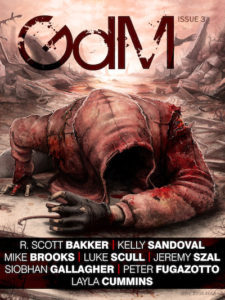Adrian Collins's Blog, page 228
November 20, 2019
REVIEW: Smoke and Stone by Michael R. Fletcher
In Michael R. Fletcher’s Smoke and Stone, the entirety of mankind dwells within the city of Bastion. Surrounded by crimson sands and sculpted from a single, seamless piece of rock by the hands of the gods themselves, the city’s society is fractured by a rigid theocratic caste system. While divinely empowered guards and a series of inner walls help to maintain a brittle peace, trouble is brewing. As hungry gods prepare for war and the city’s poorest (the Growers) chafe under the yoke of lifelong slavery, Bastion’s ancient streets threaten to run red with blood.
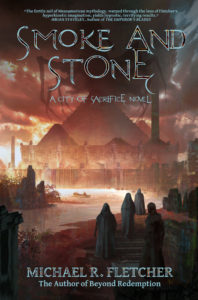 Readers experience the brutally divided reality of life in Bastion from two characters’ perspectives. The first is Akachi, a sorcerer-priest of Cloud Serpent, god of the hunt, and son of his deity’s high priest. Raised in the privileged luxury of Bastion’s highest caste, Akachi is given his first parish and a small troop of outcast guards in an impoverished Grower district full of criminals, dissidents, and heretics. The second POV character, Nuru, is an illegal street sorcerer in a struggling gang. When a mysterious scarred woman and a dark spirit from beyond Bastion’s walls offer her a chance to strike back against her oppressors, she finds herself drawn into the larger societal conflict and the brewing divine war.
Readers experience the brutally divided reality of life in Bastion from two characters’ perspectives. The first is Akachi, a sorcerer-priest of Cloud Serpent, god of the hunt, and son of his deity’s high priest. Raised in the privileged luxury of Bastion’s highest caste, Akachi is given his first parish and a small troop of outcast guards in an impoverished Grower district full of criminals, dissidents, and heretics. The second POV character, Nuru, is an illegal street sorcerer in a struggling gang. When a mysterious scarred woman and a dark spirit from beyond Bastion’s walls offer her a chance to strike back against her oppressors, she finds herself drawn into the larger societal conflict and the brewing divine war.
Throughout the novel, Fletcher skillfully juggles these POVs and switches between them at particularly tense beats in a way that kept me turning pages like a madman. Both characters are believable and sympathetic to begin with—Akachi in his well-meaning prejudice and all-consuming drive to please his father and Nuru in her desperate need to keep her friends safe and escape her terrible circumstances. Watching them change and develop in the face of unthinkable choices and desperate situations is intensely gripping to read. The author does a great job with both character arcs, and as in all the best grimdark, some changes aren’t for the better.
While I could prattle on for ages about how much I enjoyed the narcotic-based magic system these characters use, I think Fletcher does a better job of gradually and organically revealing its practices and powers through the narrative itself. The other aspects of this novel’s worldbuilding were equally excellent. The author did a great job of using little details like Grower clothing, caste-based food, and local slurs to flesh out the city’s culture and make a setting as fantastical as Bastion feel believable and grounded in reality. Bastion’s gods aren’t your mother’s pantheon—from the eldritch chaos of Smoking Mirror (god of night and chaos), to the flayed terror of Father Death (lord of the unliving and current king of the gods)—Fletcher’s take on divinity, reality, and the power of belief are as striking and keen as ever.
Overall, one of the things I enjoyed most about Smoke and Stone is how it brings truly original concepts and elements to the table. With every novel he writes, Fletcher has a way of contributing something brilliantly twisted and utterly unique to the Fantasy (or scifi) genre, and I found Smoke and Stone to be his best work yet. All in all, this book is as grim and dark as they come, and I wouldn’t hesitate to dub it a 5-star must-read for any GDM subscriber or fan of the genre.
Buy Smoke and Stone by Michael R. Fletcher
The post REVIEW: Smoke and Stone by Michael R. Fletcher appeared first on Grimdark Magazine.
November 18, 2019
REVIEW: The Killing Light by Myke Cole
The Killing Light is the last book of an immense trilogy that is both satisfying and haunting. I will be thinking about this book long after having finished it.
“The sword, the spear, these are the instruments of the soldier. The Emperor’s hands succor and provision, heal and mend. They bear the threshing flail, the only weapon that may make bread as readily as it may take life.”
—WRIT. IMP. XXI. 17.
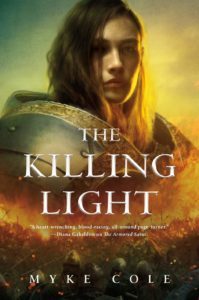 Myke Cole has emotionally raked me over the coals. He pulled no punches in this conclusion and has laid Heloise bare emotionally, physically, and mentally on the altar of grimdark fantasy. Heloise’s story, The Killing light, is the final book of The Sacred Throne Trilogy (The Armored Saint; Queen of Crows). It is also the last book of a series that Cole has written to prove to himself and the world that he can, indeed, write a profoundly dark and morally gray series outside of his normal prevue of military-based fiction.
Myke Cole has emotionally raked me over the coals. He pulled no punches in this conclusion and has laid Heloise bare emotionally, physically, and mentally on the altar of grimdark fantasy. Heloise’s story, The Killing light, is the final book of The Sacred Throne Trilogy (The Armored Saint; Queen of Crows). It is also the last book of a series that Cole has written to prove to himself and the world that he can, indeed, write a profoundly dark and morally gray series outside of his normal prevue of military-based fiction.
He nailed it.
The Killing Light is an emotionally intense and raw story. So much so that I had to put the novel down at certain points to take a breather. Heloise and her allies face the greatest challenge of their lives.
Is she the palatine of legend? What does it mean to be a hero and save everyone that can be saved? Heloise was never meant to be the hero of all. She is a young girl, meant to live out her days in a village. But one cannot choose their fate, nor who they fall in love with. All we can ever do is exist and make choices. Do our best. That is all Heloise has ever aspired to do.
Writing-wise, this story is the outcome of a few concurrently running plots. Firstly, the overarching theme of different groups is how to exist in a world of religious fervor. I especially enjoyed how Cole handled this.
There is absolute consistency in the four mentalities that Cole writes for. We have the Traveling People, Free Peoples, Villagers, and Gray Clokes. All of the cultures are equally delved into and represent different parts of the religious spectrum. Cole writes them as if they are rivers that twist and turn tumultuously over each other. Each of the main characters from different cultures reacts to situations based on their own set of experiences. It is masterfully done.
Cole creates a world full of blood and ambiguous situations. He takes a look at these complex characters and delves even deeper into their psyches. How much can a character take before that character breaks? In some cases, quite a lot, in other cases, not much. We see many of the main characters, such as Heloise, Samson, Xilkya, Onas, and Tone, flayed emotionally. I am not going to give to many details, I don’t want to spoil it. But aside from Heloise, Onas and Tones journeys are compelling and heartbreaking.
“War, she was finding, was nothing so much as a series of choices between bad and worse.”
One of the exhausting and fantastic things about The Killing Light is the pacing. I guess I should say just speed because there is only one pace in this story. Fast and unrelenting. Every moment that is written into this novella is utilized. There are no throwaways or dalliance. Much like the first two books in the series, The Killing Light is skinned to the bone. It is minimalistic writing, as there are no words wasted. Cole tells you precisely what is happening and how. This doesn’t mean that there is no character development, as I said above, the characters’ journeys are compelling. It is a testament to Cole’s skill in writing that he can say so much with so little.
I don’t believe that this novel should be read on its own. You can, of course, but I think that this book should be read after the first two. The reader will get much more from the choices and decisions of the characters. Cole doesn’t spend a lot of time going over the minutiae of the first two stories.
In the end, I believe that Heloise is the character we need right now in fantasy. We need morally gray characters, written with thought and nuance. Ones where sexuality, emotions, backstory, and decisions are written well and with forethought. This series and especially The Killing Light are that in spades. “Just one more impossible thing” sums up the drive and overarching theme of this series. Heloise sends herself into the darkness to conquer just one more impossible thing over and over.
I am so glad that Cole has taken us readers for the ride.
Check out The Killing Light by Myke Cole on November 12th.
ARC provided by the publisher Tor.com—in exchange for an honest review. Read an excerpt here.
Buy The Killing Light by Mike Cole
The post REVIEW: The Killing Light by Myke Cole appeared first on Grimdark Magazine.
November 17, 2019
REVIEW: The House of Night and Chain by David Annandale
Horrific influences and elements permeate every facet of the Warhammer Universe–from the old World of Warhammer Fantasy, to the Realms of Age of Sigmar, and on to the grimdark future of Warhammer 40,000. From the terrifying machinations of Chaos gods, to the ravenous chitterings of Warp creatures ready to feast on febrile minds, terror is everywhere. So, it was only natural that The Black Library launch its own Horror line (an umbrella under which stories which transpire in the multitudinous Warhammer settings can be told). One of the first full-length novels released under this imprint is The House of Night and Chain, by David Annandale; which I’ll be reviewing today.
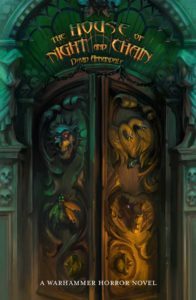 The House of Night and Chain takes the standard ‘haunted, sentient house’ template, and customizes it for the 40K universe. It follows an Astra Militarum colonel named Maeson Strock, who is ‘put out to pasture’ following a horrifyingly pyrrhic victory against the endless swarms of the Tyranids on a planet called Clostrum. Being a descendent of the ruling family on his home planet of Solus, Strock is charged with assuming the Lord-Governorship. Through this position, Strock is to quell the rampant corruption festering on Solus, perpetuated by the other ruling families.
The House of Night and Chain takes the standard ‘haunted, sentient house’ template, and customizes it for the 40K universe. It follows an Astra Militarum colonel named Maeson Strock, who is ‘put out to pasture’ following a horrifyingly pyrrhic victory against the endless swarms of the Tyranids on a planet called Clostrum. Being a descendent of the ruling family on his home planet of Solus, Strock is charged with assuming the Lord-Governorship. Through this position, Strock is to quell the rampant corruption festering on Solus, perpetuated by the other ruling families.
The heart of the Strock fortune is a mineral-rich hill; whose deposits granted the family their ascendency. At the center of this property is the imposing estate of Malveil. Within Malveil’s foreboding walls, Maeson’s predecessor lost his mind. And, it was from Malveil’s heights that Maeson’s wife, Eliana, leapt to her death.
See, as in all good haunted house stories, Malveil has a malevolent sentience all its own. It calls the Strock’s home, to fulfill their obligations as stewards of Solus; and then, it slowly asserts its dominance over them.
Well, let’s take a quick look at the blurb, and then examine the elements of the book itself:
In a bleak corner of the city of Valgaast, the House of Malveil awaits. A place of darkness, its halls throb with a sinister history. Its rooms are filled with malice. Its walls echo with pain. Now it stirs eagerly with the approach of an old heir – Colonel Maeson Strock of the Astra Militarum has returned home to his ancestral mansion. He is a man broken, both by the horrors of war and by personal loss, and he has come home to take up the mantle of Planetary Governor. He hopes he can purge his home world of political corruption, and reforge connections with his estranged children. He hopes he can rebuild his life.
Malveil will feast on these dreams. Strock believes he has seen the worst of the galaxy’s horrors. Malveil will show him how wrong he is.
Characters
The House of Night and Chain is told in the first-person POV of our protagonist, Maeson Strock. Annandale’s core focus with the books is on Maeson, and his slow, deliberate decline into madness. Considering this, he’s done a commendable job fleshing out this character. Maeson is haunted by his past ‘failures’ (the pyrrhic win at Clostrum, the loss of his wife, his estrangement from his children), and yet he approaches his new duties on Solus with the consummate professionalism of a lifelong military man.
Annandale does a masterful job charting Strock’s decline. We go from watching his successful attempts to combat and stamp out the embedded corruption, dodging assassination attempts, and trying to reconcile with his children, to bearing witness to his grasp on sanity become more and more tenuous as Malveil asserts its devious nature. Whispers, and laughter of children long gone are heard around every corner. Glimpses of things which should not appear. Endless passages, and a constant sense of foreboding.
A major catalyst in Strock’s mental decline is his wife, Eliana; who is fleshed out primarily in epistolary format via a discovered journal. Through its entries, which depict a woman becoming increasingly unhinged by Malveil’s machinations, we can chart a distinct parallel with Strock’s experience. Malveil calls, claims, then owns.
Eliana’s story is another tragedy; a formidable woman, she did what she felt was right, serving as her husband’s political proxy in his absence, paying the ultimate price.
Secondary characters include Strock’s now adult children, two close friends/confidants, and a primary rival among the ruling families. All of these characters are compelling; just I wish we could have seen more of them. This is understandably difficult; as the story is told from Strock’s point of view, and said viewpoint becomes increasingly myopic as Malveil’s tendrils tighten.
Finally, the primary antagonist of the story is Malveil itself. In Malveil, Annandale has created a delightfully diabolical entity. While the causal factors of Malveil’s evil are easy to predict, the execution is spot-on, keeping the reader invested.
Action
When one thinks of haunted house yarns, the term ‘action-packed’ rarely comes to mind. With that in mind; I must say that Annandale does an exemplary job of integrating blistering 40K elements with traditional haunted house proceedings. The Clostrum flashbacks are insanely frantic, urgent, and terrifying. Annandale, a longtime kaiju fan, is excellent at depicting the truly monstrous aspects of the Tyranids.
There are also a few setpieces; attempts on Strock’s life, which are presented quite well. Particularly of note is one involving a bridge collapse; the magnitude of which is conveyed so convincingly that I felt it was transpiring before my eyes.
Also, when House of Night and Chain reaches its climax, there are a few brutal action scenes as well; bloody, brutal, and horrifyingly satisfying.
Overall Writing Style
In the past, Annandale has been a bit hit or miss for me. I’ve always said; there’s three topics he excels at: Faith (or crises thereof), Horror, and Kaiju/Monsters (for an excellent story which combines all three masterfully, I’ll always recommend his story The Conversion, from the Kaiju Rising anthology).
That being said, because of his passion for horror, Annandale is one of the few Black Library authors that I was truly looking forward to a Warhammer Horror entry from. And, I’m happy to say, he does not disappoint at all. The mechanics for a solid haunted house yarn are here. Annandale knows how to plant, and cultivate fear, unease, and terror. There is no sense of safety. Hell, there is no sense of sanity. We, the audience, are kept in the dark just as much as Maeson Strock is, and this guarantees a bizarre, discomfiting ride in the latter portions of the book.
Annandale knows when to keep the terror subtle, and when to showcase the blood-soaked, the gruesome. This is an extremely tough balance to strike, so kudos to Annandale on doing it proficiently.
There are, however, a few quibbles that I have with The House of Night and Chain. The first has to do with some of the character descriptions. Many of the characters are initially described in ways to portray them as either horrifying or bizarre; i.e. a personal driver/guard whose lower body is a continuous track system, the full back brace which restricts his daughter to a severe rigidity, his son’s slovenly figure, molded by a life of decadence. Of particular note is Montfor, Strock’s archenemy on the Council, who has a face which is literally rotting away.
My point is that these physical aspects should have been played upon in every encounter Strock has with these characters. So much in horror is predicated upon what generates unease; especially in everyday situations. Physical appearances (especially the hideously warped), reinforce this motif. They were introduced for a reason; ergo, they should have been utilized more.
Another (very minor) issue is with a sense of scale. To be fair, this affects a lot of sci-fi works, so it’s not limited to this book. Everything in this book has a very ‘local’ feel, although the events are supposed to have global ramifications. And yet, all of the critical decisions of a mineral-rich world transpire within a close, ramshackle area. It doesn’t feel right. In the end, it feels as though Strock is less a planetary governor, and more the governor of Valgaast (the region where the story takes place) alone.
Again, a minor complaint, but still.
Final Thoughts
Simply put, Annandale hit it out of the park with The House of Night and Chain. This is a story which is, in turns, exhilarating, terrifying, and heart-wrenching. Annandale marries campfire horror with grimdark military sci-fi to yield a blood-curdling tale of consummate terror.
Highly recommended.
Buy the House of Night and Chain by David Annandale
The post REVIEW: The House of Night and Chain by David Annandale appeared first on Grimdark Magazine.
November 15, 2019
REVIEW: Gideon the Ninth by Tamsyn Muir
Tamsyn Muir’s debut novel, Gideon the Ninth is a dark, irreverent, bonkers and beautiful story featuring competing necromancers, duelling cavaliers, and a protagonist with a genuinely unique point of view. When the Emperor invites the heirs to the eight great necromantic houses to compete for a place by his side as one of his immortal Lyctors, Gideon Nav–put-upon servant of the Ninth–begrudgingly accompanies her childhood adversary Harrow to the mysterious Canaan House. There, surrounded by strange rivals from the other houses, Gideon and Harrow must find a way to work together despite their unhappy history if they’re to survive the dangers of the coming trials.
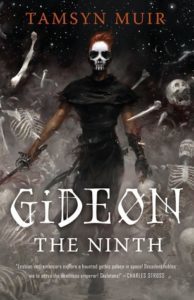 It’s a sort of necromantic haunted house whodunnit, a wildly ambitious science fantasy story set in a world where domesticated skeletons walk dusty halls and duels are fought at swordpoint, while ancient technology lies dormant and wars are fought with a mixture of magic and force of arms. Very little of the world is explained or justified up front, rather being gradually revealed as the narrative develops and characters interact with it. At times Muir’s prose grows a little dense, and she takes her time building up the structures and mechanics of this strange society, but with a foundation of necromancy as the norm it’s sufficiently engaging right from the off to be clearly full of promise. Perseverance is then rewarded with an intriguing sense of depth and history to the setting which hints at more to come even as it draws you in.
It’s a sort of necromantic haunted house whodunnit, a wildly ambitious science fantasy story set in a world where domesticated skeletons walk dusty halls and duels are fought at swordpoint, while ancient technology lies dormant and wars are fought with a mixture of magic and force of arms. Very little of the world is explained or justified up front, rather being gradually revealed as the narrative develops and characters interact with it. At times Muir’s prose grows a little dense, and she takes her time building up the structures and mechanics of this strange society, but with a foundation of necromancy as the norm it’s sufficiently engaging right from the off to be clearly full of promise. Perseverance is then rewarded with an intriguing sense of depth and history to the setting which hints at more to come even as it draws you in.
Narratively it also starts quite slowly, in the morbid gloom of the Ninth House, as Gideon and Harrow’s relationship is introduced and their mutual hatred established. Gideon’s voice comes through straight away–irreverent and entertainingly blunt, though with a childlike intensity and naivety–and provides something to latch onto early on, but even once events move to Canaan House the pace remains a little sluggish, exacerbated by the introduction of the necromancers and cavaliers from all seven other houses. It’s a lot of names and roles to remember, but while it takes a little while to figure things out, before long the personalities of the necromancer/cavalier pairings is clearly, cleverly visible as the plot develops into a tense, nervy whodunnit. Even as the characters themselves struggle to understand exactly what they’re supposed to be doing, possibilities arise, tentative alliances are made and Gideon’s mind is repeatedly blown by the realities of life outside the Ninth House.
It’s a really clever story all told, packed full of twists and tremendously entertaining action, and once the pace starts ramping up it all escalates into a ferociously exciting conclusion that leaves you breathless, exhilarated and–frankly–traumatised. Central to all of that is Gideon and Harrow’s relationship, which slowly develops from deeply adversarial to something strangely, appropriately different – but always founded on shared connection, despite everything. Gideon’s voice is wonderful, and feels very different to the usual SFF tone, while her personality–me-against-the-world, cocky and confident but strangely sheltered–gives a wonderful perspective to what’s taking place around her. In a world of necromancers, animated skeletons and wide-ranging bone magic, a cynical lesbian with a sword, a strong arm and a sharp wit just makes so much sense. This might not be for everyone, and certainly rewards a little patience, but for those willing to relax into it, there’s a lot to enjoy.
Thanks very much to Tamsyn Muir and Tor.com for sending me a copy of Gideon the Ninth in exchange for this honest review!
Buy Gideon the Ninth by Tamsyn Muir
The post REVIEW: Gideon the Ninth by Tamsyn Muir appeared first on Grimdark Magazine.
November 12, 2019
REVIEW: Sword of Destiny by Andrzej Sapkowski
Sword of Destiny is a slavic fantasy book that contains the brilliance captured by the video game series, as well as the repertoire of characters that Andrzej Sapkowski has at his disposal. This second collection of short stories in the world of the Witcher is a book that those who enjoyed the first collection, will love, as it brings more of the same.
’What a hideous smile I have, Geralt thought, reaching for his sword. What a hideous face I have, and how hideously I squint. So, is that what I look like? Damn’
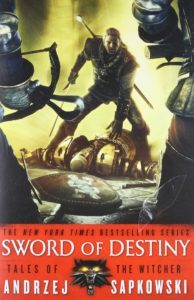 Geralt is such a great character, we have now had two whole books to get to know him as a Witcher, and understand his motives and background. Sword of Destiny does a good job of building upon the foundations of his character, lain by The Last Wish. Although still a short story collection, the development of Geralt is satisfying and evident much more in this volume. These chapters are linked, through characters that appear in multiple short stories, and Geralt’s engagement with them creates a fun experience.
Geralt is such a great character, we have now had two whole books to get to know him as a Witcher, and understand his motives and background. Sword of Destiny does a good job of building upon the foundations of his character, lain by The Last Wish. Although still a short story collection, the development of Geralt is satisfying and evident much more in this volume. These chapters are linked, through characters that appear in multiple short stories, and Geralt’s engagement with them creates a fun experience.
Geralt’s cool-rating went up and up with each conversation, his witty and intelligent self shining in this collection. However, what frustrated me was his bumbling and pretty strange character when in the company of Yennefer, though maybe I’m still too used to the Geralt from the Witcher 3.
‘Don’t teach me how to trade you prat’
The stories in Sword of Destiny contained some fantastic examples of fantasy done at it’s highest, with dragons, dwarves, shape-shifters and doppelgängers, ferocious monsters, and high-magic. The variety ensures that you will love at least one of the stories and enjoy most of them. I loved how different each story was, with their own morals and messages they portrayed. This is one of Sapkowski’s many strengths, where he carves a small book into a unique experience that challenges your ideas. The realisation that this is a fantasy book is pushed to the back of your mind, where it can also be perceived as a social commentary regarding issues that are still relevant today.
Also there’s swords. Lots of different swords. It’s pretty awesome, and the action is well-done, however rare. The dialogue was a big step-up in this second chapter, and the exchanges between characters was enjoyable and fun. Dandelion comes into his own in this, showing the many layers of his character (more layers than Shrek!). I also enjoyed the introduction of Ciri, a character so central to the Witcher 3. Although it was equally amusing and shocking to listen to the narrater’s thick Scottish portrayal of her.
‘Has anyone ever told you that you are gorgeous?’
4/5 – A similar but satisfying continuation of the Witcher series. A step-up from The Last Wish that delivers emotionally and physically punching stories. The variety keeps you on your toes, and the development is good. Geralt is still a very cool guy, and I look forward to beginning the full novels of these soon.
Buy Sword of Destiny by Andrzej Sapkowski
The post REVIEW: Sword of Destiny by Andrzej Sapkowski appeared first on Grimdark Magazine.
November 11, 2019
REVIEW: Onslaught of Madness by Jesse Teller
Onslaught of Madness was my second foray into the world of Perilisc, as told by the gifted author Jesse Teller. I’ve also reviewed Song by the same author for Grimdark Magazine.
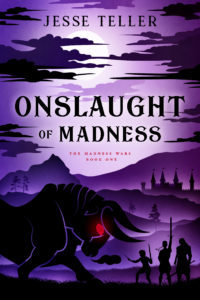 While Song introduced us to a marvelous and mysterious world full of magic and intrigue, we only got a snapshot of the workings of the near-immortal beings that steer the course of humanity across the continent. With Onslaught of Madness, we get another angle on this, but from a much larger scope.
While Song introduced us to a marvelous and mysterious world full of magic and intrigue, we only got a snapshot of the workings of the near-immortal beings that steer the course of humanity across the continent. With Onslaught of Madness, we get another angle on this, but from a much larger scope.
Drine is invading the neighboring country of Tienne. Drine has a huge military and is bent on conquest, with its king sending one of our POV characters to lead his forces in this full invasion. Rextur is a follower of Dis, the God of Destruction, and he’s been planning this invasion for years. Even so, the king has ordered him to action much sooner than Rextur had hoped for, and he’s now forced to wage his war early, taking the king’s son and heir with him to bask in his glory.
Among those opposing Rextur and the Drine forces are a small group of unlikely heroes.
Aaron the Marked is a 12 year old boy barbarian warrior traveling with the entirety of the Nation of Three, of which he is 1/3 of the total population. The boy king Peter and the equally young lad Jordai Stonefist finish the Nation of Three and are often underestimated due to their young age.
Vianne, the Porcelain Witch, is a young noblewoman who has been given training in becoming a Mage along with her pampered life in the nobility. Her mentor has been rather cruel and abusive in his training, and she’s betrothed to a man she doesn’t love.
Sai Summerstone is one of the world’s greatest swordsmen on a quest to find his long lost love, who he can see in his dreams but can’t quite pinpoint her location. He meets up with another of the world’s greatest swordsmen and they form quite the formidable pair to help defend one of Tienne’s cities against the Drine forces.
Tera is a young lady from a neighboring country who is training as a holy warrior for the child god Boxhead. She is sent on a quest to find the next Perpetual Child to lead her church, and protect the children that will be uprooted in this war.
Arundis is a mysterious figure that comes into the POV scene later on, and we’ll leave that for his eventual entrance.
These characters are joined by a large cast of supporting figures in this epic struggle which gets its start in this first book of the series. The scope of this novel is vast, and it takes quite an immersion to really see how it all fits together.
I mentioned Steven Erikson in my review of Song, as I compared Teller to him for his technique of dropping the leader into the action without knowing a lot of the backstory. We just have to run with it, trusting that important facts will be revealed as needed but not before. While I did see that with Song, it’s even more prevalent in this book, using quite a few more pages to bring us fully into the scene. Even then, there’s a lot that readers won’t understand right away, but if the reader trusts Teller and goes with it, the payoff is there.
This story is equal parts grim and dark, but is so much more than a sum of those parts. There are some heart wrenching moments, and it’s not for the faint of heart. I very much look forward to the next book in this saga, as I can see that once it’s complete, we’ll have the real payoff and I expect Teller to provide plenty of surprises along the way. Not all of them pleasant, for the characters at least. For the reader, this is a feast worth getting in straight away without the appetizers.
Buy Onslaught of Madness by Jesse Teller
The post REVIEW: Onslaught of Madness by Jesse Teller appeared first on Grimdark Magazine.
November 9, 2019
REVIEW: Sons of Thunder by Giles Kristian
In the name of Odin, Sons of Thunder is a mind-blowing and shield-bashingly good book. The second instalment in the Raven series, Giles Kristian has crafted a rich tale that has everyone you want in a book.
“A man who puts his hand into wolf’s mouth should not be surprised if he eats his next meal with just one hand”
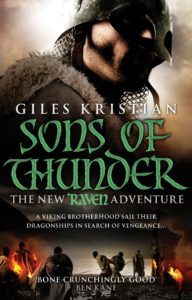 Sons of Thunder picks up straight from Blood Eye, and wastes no time in setting sail into the dark ages. Osric ‘Raven’ is with the crew of Norse traders / marauders (depending on which mood takes them) as they seek vengeance and revenge upon the Saxon king, Ealdred. This tale abandons the Saxon land that we are familiar with from books of Bernard Cornwell, and crosses the sea to the land of the Franks, and the famous emperor Charlemagne.
Sons of Thunder picks up straight from Blood Eye, and wastes no time in setting sail into the dark ages. Osric ‘Raven’ is with the crew of Norse traders / marauders (depending on which mood takes them) as they seek vengeance and revenge upon the Saxon king, Ealdred. This tale abandons the Saxon land that we are familiar with from books of Bernard Cornwell, and crosses the sea to the land of the Franks, and the famous emperor Charlemagne.
I really cannot express how awe-inspiring and phenomenal the story-telling is. Kristian’s writing paints a picture so vivid that I can taste the sea air and mead, and see the shield-walls, dragon-ships, and lice-infested beards. The characters are brilliant, with he formidable Sigurd, the witty Olaf, the dark Floki, and many others that nearly steal the show.
“A man’s fate is always shrouded by fog”
The crew are such a high-point of this book. Their banter is hilarious, and the bond they share is real and emotional. The land is grim and dark, yet this band of men just make me wish I was pulling an oar beside them, counting the booty we had amassed and de-rusting my brynja with a sack of sand.
This fresh portrayal of the dark ages is easily among my favourite historical-fiction books. Giles Kristian is a genius at work, and his work has truly captured my attention, with little room for anything else. The pages are seeping with Norse history and information, the language is captivating, and scenes are breathtaking.
“You can go back the way you came, but that course in itself feels stale, for you merely re-live what has already been.”
5/5 – Grim, dark and bloody, there is plenty here for readers of fantasy to love. Please read these books, if it’s the first historical fiction series you read or the four hundredth. You won’t be disappointed.
Buy Sons of Thunder by Giles Kristian
The post REVIEW: Sons of Thunder by Giles Kristian appeared first on Grimdark Magazine.
November 7, 2019
REVIEW: Master of Sorrows by Justin Travis Call
Master of Sorrows by Justin Travis Call is the book I have been waiting for all year. Ainnevog, let’s call him Annev, is a boy with a simple but not easy path before him. He works as a deacon at a school and also takes classes to become an avatar there. An avatar is one who goes out into the world, finds magical items, and brings them back to the school so that they can be safely stored away. In the world that Call has created, magic use is verboten. If one is found to be using magic or has the magic gift, they are flayed alive and stoned. Passing the Avatar of Judgement classes and final tests for Annev is an all-consuming endeavor. Only the best can become an avatar. While taking his classes, Annev also studies and is guided by the school’s priest and father figure, Sodar. How will Annev balance the two halves of his life? The public half, avatar trainee and rule-follower with the secret half, magic-user, and possibly as a destined hero. That is the crux of the story, duality.
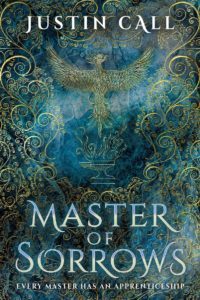 Furthermore, to add to the duality of the plot, Annev is on the precipice of manhood. Of coming into his own and knowing who he is. But, as it stands, he is not quite a boy nor a man.
Furthermore, to add to the duality of the plot, Annev is on the precipice of manhood. Of coming into his own and knowing who he is. But, as it stands, he is not quite a boy nor a man.
Master of Shadows is in the style of Patrick Rothfuss’s epic Name of the Wind and Pierce Browns Red Rising series. They all share similar trajectories. A boy, from dubious circumstances, is thrust into a world they can not quite understand, in Master of Shadows‘ case, an anti-magic school. This boy is destined for greater things but is hampered on all sides by morally grey characters. I say they share similar trajectories, but there is nothing bland or hackneyed in Master of Shadows.
The plotting and backstory of Master of Shadows are tightly done and rich in history. Annev comes from a world of gods, precisely three major ones – all siblings. Odar, Lumea, and Keos. Two of the gods, Odar and Lumea, are still culturally and spiritually revered by the public. But the other god, Keos, is considered the betrayer. Those who are born disabled are said to have been touched by Keos. They are considered to be in Keos’s favor and are immediately put to death. But in Annev’s case, as he was born without a left hand, instead of death, he was saved and raised by Sodar. This becomes another part of the duality and line that Annev must walk. He is the antithesis of everything an Avatar of Judgement is, yet he battles and struggles to excel and achieve an Avatar position, all while hiding his disability.
One of the detractors of the story, there are very few, is the love interest between Annev and Myjun. Watching from the position of a reader, one can look at a relationship like Annev’s and Myjun’s and think it is incredibly unrealistic and sometimes silly. Annev makes buffoonish decisions that made me want to shake him. But isn’t that what it is like when you are 17? You make stupid choices because your body is going berzerk with hormones. As much as I cringed when reading about Annev’s mooning, it is a realistic detail. Annev needs to experience things like love, loss, and betrayal on his narrative path so that he is a full and round character. This relationship is something that an older and wiser Annev in later books can pull and learn from. Also, the exposition of the story in some parts was lengthy. This is necessary due to the humongous back story and cultural context that Annev’s character exists in. Sometimes, I wanted to get back to the action, but these chapters are necessary.
One of the significant strengths of the story aside from the tight plot was the relationship between Sodar and Annev. Sodar is not all that he seems. He was living a double life; one as a priest to the students the other as scholar and magic-user. The later he keeps hidden to all but Annev, whom he has raised from a baby and trusts. Sodar is the stern father figure character that attempts to guide Annev to his destiny while similarly protect him from the details of it. They have an easiness between them that has developed throughout their shared lives and is a testament to Call’s writing skills that this came off effortless. I believed in their relationship, and it presented no false notes to me.
Another major strength in this story is the tense action sequences. They flowed like water from scene to scene and are some of the best I have read. Whether Annev is battling wild contraptions in his bid for a position as an avatar or fighting Feurog’s (creatures that are made of metals, stones, and flesh), the pulse racing, edge of your seat intensity kept me reading into the late hours.
The first narrative arc for Annev is done, but his story is far from over. Master of Shadows can be read as a stand-alone novel if one desires; however, the outcome was a bit of a cliffhanger that and had me yearning for more. I want to know where this story is going. . I want to more about Annev and about who accompanies him on the next part of his journey.
I hate that it hasn’t been written yet!
Master of Sorrows is one of the best books I have read this year and a perfect example of grimdark fantasy. It isn’t overly mired in negativity or cruelness. The rawer parts of grimdark and epic fantasy are there, but this story is tinged with hope in the best possible way. It is riveting, exciting, and one that is going to stick with me for a while.
I cannot wait to read the next one, solid five-star novel, and I highly recommend it.
Buy Master of Sorrows by Justin Call
Master of Sorrows lost chapters!
Justin was awesome enough to drop us one of his cut chapters. Chapter 24.5 is an interesting one, not just because it didn’t make it into the final book, but also because it reveals so much more about the wood-witch (Kelga) and the Shadow Reborn (Oyru). Come check it out–click here!
The post REVIEW: Master of Sorrows by Justin Travis Call appeared first on Grimdark Magazine.
November 4, 2019
Grit in Your Controller: Grimdark and Gaming
By Jeremy Szal and Layla Cummins – originally published in GdM#3
Video games are nothing short of a controversial topic within the entertainment industry. From fuming politicians on the morning news to bloggers with an axe to grind, they always have been and always will be a point of contention. You may not be an avid enthusiast, but their contribution to social issues and their aesthetically expressive visuals, storytelling, characters, and worlds are undeniable. To consider them anything less than works of art would be ignorant. And a fair share of these games have a horse of their own running in the world of grimdark. Far more than you might think.
In our favorite grimdark novels the main characters make morally ambiguous decisions that affect the outcome of their stories, for better or worse. For example, Abercrombie’s Inquisitor Glokta attempts to save Dagoska in Before They Are Hanged by getting into bed with the banking house Valint and Balk. Glokta knows Valint and Balk will expect favours of him that will corrupt his role as an Inquisitor, but does it anyway to save the city. It is this same sense of moral ambiguity and self-determination that is becoming central to so many popular video games. Acclaimed books and series like The Witcher (Andrzej Sapkowski), Metro 2033 and 2034 (Dmitry Glukhovsky), A Song of Ice and Fire (George R.R. Martin), The Walking Dead (Robert Kirkman), and even Heart of Darkness (Joseph Conrad) have shown how grimdark novels and gaming can blend seamlessly into one. Perhaps the smooth transition from paperback to controller says a lot about what video game audiences are eager to digest.
In video games it is usually some kind of built-in morality system that allows players to perform actions and make decisions that ultimately determine their character’s future in the game world. Many of these choices are difficult, influencing… These allow the player to perform actions and make decisions that manipulate the system one way or another. Many of these choices are difficult, influencing the world around the player and the way NPCs (non-playable characters) react to the protagonist. In the cases of RPGs like Mass Effect 2 (2010) certain choices can even change the game’s ending. These choices are clearly defined, even highlighted in red or blue, corresponding to the key morality of the decision. The choices are grey at times, and both have an impact in different areas, but it’s clear which path a certain action will take you.
But what if those moral guideposts are stripped away all together?
In The Witcher 2 (2011) you are Geralt of Rivia, a hunter of monsters and wild beasts. But more often than not real monsters come in the form of human beings. Of ordinary people and raw violence. The opening scenes set the stage for the morally grey world that you live in. Do you accept a bribe from a corrupt warden and use that money to better your chances of survival? Do you accuse a powerful archer of murder on the eve of battle, or do you betray the lusty succubus who accuses him? There is no pre-defined good or bad, no blue and red bar indicating your morality. There are only choices and consequences, for better and for worse. Like in other RPGs these choices impact the game’s world, diverging your paths and showing your point of view from opposing sides. Different playthroughs could even have you fighting for the other team. Geralt himself is a rogue in the greatest sense. He’ll do his duty and search for his kidnapped partner, yet sleep with every prostitute that comes his way. And he’s not above getting blood on his hands when he needs to, innocent or otherwise.
Metro: Last Light (2013) has a similar feature. The game does not let you know that a morality system exists. Your actions alone dictate how the overarching story ends. Likewise, in Dishonored (2012) the entire game world will shift depending on your actions. Should you choose to perform lethal assassinations on your targets, sprinting through the alarm system at full blast and slaughtering the guards who get in your way, your teammates will soon turn on you. Leading them to political ruin and even staying your hand affects the physical state of the city of Dunwall. The more bodies you pile up, the faster the plague spreads. Your own discernment is needed to decide if a certain character truly deserves to die.
Fallout 3 (2008) is yet another title that perfectly encapsulates the grimdark genre. Set in post-apocalyptic Washington, D.C., it combines dark humour with a quantifiable Karma scale. Every decision, from stealing items to killing another character, affects the player’s Karma. Choices that can alter gameplay come from main and side quests and include deciding whether to obliterate an entire town or participate in an assisted suicide. Before jumping into the Fallout series’ revival, lead writer and designer Emil Pagliarulo had previously worked on the “Dark Brotherhood” sequence in Bethesda Game Studio’s multi-award-winning The Elder Scrolls IV: Oblivion (2006). In an interview with Gamasutra, Pagliarulo claimed the Dark Brotherhood story was “for those players who have jumped over [the] moral fence and never want to look back […] [Fallout 3] is all about giving players a choice and giving the player the voice they want to use.”
A trope in many video games is the battle against some form of inhuman enemy, be it monsters, demons, ghosts, zombies, or any other form of cannon fodder that’s churned out for the player. There are some games that subvert that, forgoing supernatural evil for a more human villain. In Heavy Rain (2010), an oppressive, intense thriller with a distinctly nihilistic art style, you are pitted against a serial killer with a genuine motive — a villain who is real, life-like, and human. Any of the mentally unstable four main protagonists could be the serial killer, leading us to conclude that they are all unreliable narrators and what we are being told may not be the truth. Morally grey characters are the quintessential core of grimdark. Constructed with flaws found in people like ourselves, they establish a genuine link to characters who would otherwise be cardboard cut-outs having a punch-up on screen. And the entire cast of Heavy Rain are as real as they are flawed.
Often in games where choice is a factor, even the morality of the hero is called into question. In The Wolf Among Us (2013), you are Bigby, the same big bad wolf from the fairy tale, moved to the city along with almost every character to ever grace mainstream folklore. It’s the very definition of a gritty revamp, taking all the traditional archetypes of characters handed down for hundreds of years and painting them with a distinct noir flavour, done up with blood, mud, swears, booze and cigarettes. The slightest decision, even if your intentions are good, could cost you dearly and create dozens of additional enemies. Soon the entirety of Fabletown is at risk and the waters of morality become so muddled that you start to question if the ultimate villain is really you. At the end of the day, everyone from Bluebeard to Snow White is human at heart, and several characters will die horribly. No matter the outcome, there’s always that little niggle in the back of your mind: Did I really do the right thing? Was he actually telling the truth? Should I have listened to her? Nothing is ever certain, least of all the moral standing of the characters. Similarly, the conclusion of The Last of Us (2013) forces you to question who exactly the villain is — something that is left up to the player’s interpretation. We cannot negate the character’s actions, but their impact is left lingering in our minds.
It’s this morally ambiguous aspect of RPGs that keeps gamers coming back for more. Bioware’s surprise hit Dragon Age: Origins (2009) avoided the familiar paragon/renegade system from the Mass Effect series, opting instead for companion approval ratings. “It’s about difficult choices,” said lead writer David Gaider in an interview with Newsarama. “I don’t like easy, happy endings […] what I like is presenting decisions where the player has to stop and maybe isn’t quite sure as to what is the right thing to do […] In a game you have a unique aspect with the element of interaction and personal investment that you can’t really get in some other passive entertainment.”
With game designers like Pagliarulo and Gaider pushing for more immersive gaming experiences, it’s no surprise that technology is quickly filling in the gaps. The creation of Oculus Rift, a ground-breaking virtual reality headset, is beginning to change the way we play videogames, and the potential for grimdark gamers is huge. Ever wondered what it would be like to step into the Game of Thrones universe and create havoc in King’s Landing? Or ride across the Broken Empire world as Jorg’s road brother? The opportunity may be closer than you think.
But how far is too far? In the 2014 documentary DRONE by Norwegian filmmaker Tonje Hessen Scheiand, she focuses on the recruitment of young pilots at gaming conventions. “I came across a story of a gamer who dropped out of high school, joined the military, and very quickly became a drone pilot through the kind of skills he’d acquired gaming,” she said in an interview with VICE. “The US Army has used virtual reality and video games as a recruiting tool for a long time. They’ve been testing out different games and strategies, and they actually created their own video game, America’s Army, which is very much a recruiting tool.”
Video games were once looked down on as nothing more than time wasters for prepubescent boys squatting in dark rooms, and in some ways they still have a long way to go. But they’ve ensnared and captivated millions of people who once would never have dreamed about picking up a controller. They often provide social commentary, metaphysical scenarios, morally grey worlds filled with complexity and engaging decisions and, more importantly, show us characters just as flawed as ourselves. Characters we can connect with, regardless of if they’re the big bad wolf from fairy tales, monster hunters, assassins, or even a bitter teenage girl trying to scrape her way through a dark world. These characters feel human. They take us on journeys of dark beauty and horror, of grim realities and harrowing adventures that portray the harsh grey morals of our own world and the glimmers of hope we find in it. And thanks to the medium of interactive video games, it’s we the players who will be making the decisions. We’ve read and watched the characters from A Song of Ice and Fire make fiendishly hard decisions and face overwhelming brutality. Now we can directly engage with the world of Westoros (and countless others), make these tough choices and watch the results unfold, for better or worse. Each death will be another stain on our hands on a journey where corpses serve as steps to victory. And we must live with the decision we make.
You might not survive the journey, but that’s half the fun.
•
Originally published in Grimdark Magazine #3.
Grimdark Magazine #3 is available for purchase from our catalogue.
The post Grit in Your Controller: Grimdark and Gaming appeared first on Grimdark Magazine.
November 3, 2019
REVIEW: The Last Wish by Andrzej Sapkowski
The Last Wish is the first chapter in the epic Witcher series, opening Geralt’s tale with a brutal and fun bang. Book 1 of the Witcher introduces the slavic high-fantasy land teeming with faerie tales. It also includes one of the most iconic main characters in the genre.
“There’s a grain of truth in every fairy tale.”
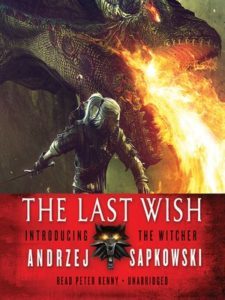 Geralt: Job description – total legend, kills monsters for cash, casts a few spells, drinks some potions, looks cool whilst doing it. Geralt is by profession a Witcher, an outcast of society unless people are desperate for someone to rid them of an unpleasant creature, wyvern, werewolf. In that case he is their first port of call. The Last Wish features a series of short stories. For those who have played the video games, I did not find the original portrayal of Geralt to be as collected, witty and intelligent as the game highlights. I enjoyed his character throughout though, liking the different Geralt.
Geralt: Job description – total legend, kills monsters for cash, casts a few spells, drinks some potions, looks cool whilst doing it. Geralt is by profession a Witcher, an outcast of society unless people are desperate for someone to rid them of an unpleasant creature, wyvern, werewolf. In that case he is their first port of call. The Last Wish features a series of short stories. For those who have played the video games, I did not find the original portrayal of Geralt to be as collected, witty and intelligent as the game highlights. I enjoyed his character throughout though, liking the different Geralt.
The cast of characters behind Geralt was particularly enjoyable, and through the format of short stories, Geralt was able to in a lot fo different places with a lot of different friends and enemies. Classics such as Dandelion, Yennefer and Foltest appear and give the stories their individual depths. Also I loved finding out how Geralt became to be called the the Butcher of Blaviken.
“People,” Geralt turned his head, “like to invent monsters and monstrosities. Then they seem less monstrous themselves. When they get blind-drunk, cheat, steal, beat their wives, starve an old woman, when they kill a trapped fox with an axe or riddle the last existing unicorn with arrows, they like to think that the Bane entering cottages at daybreak is more monstrous than they are. They feel better then. They find it easier to live.”
I really enjoyed how Andrej Sapkowski took on common tropes and old fairy tales and gave them a new lease of life. It was refreshing and a lot of fun to read stories such as Beauty and the Beast in a medieval-inspired setting. This range of short stories allowed Sapkowski to experiment with issues that Geralt seemingly tackles throughout such as racism and xenophobia. Sapkowski decided to not tackle sexism however, and this book is ripe with derogatory scenes regarding women.
The dialogue and writing style seems very alien, I would guess in part to the translation, in part perhaps to his style. It is stuttery and very simple, and at times cringy. There is a lack of character development from Geralt, no overall plot or motivation for him. However, I couldn’t help but still enjoy the book. It is unique and fun, has enough variety in each story to keep the pages turning, and especially if you enjoyed the games like I did, it is fantastic to read more about the world and lore, especially in time for the Netflix adaptation!
“But if I’m to choose between one evil and another, then I prefer not to choose at all.”
3.75/5 – A fun and enjoyable introduction into the world of the Witcher. I expected more, but wasn’t too disappointed. Playing the games definitely added to this experience, and I am definitely going to carry on through this series. IGNI!
Buy The Last Wish
The post REVIEW: The Last Wish by Andrzej Sapkowski appeared first on Grimdark Magazine.

